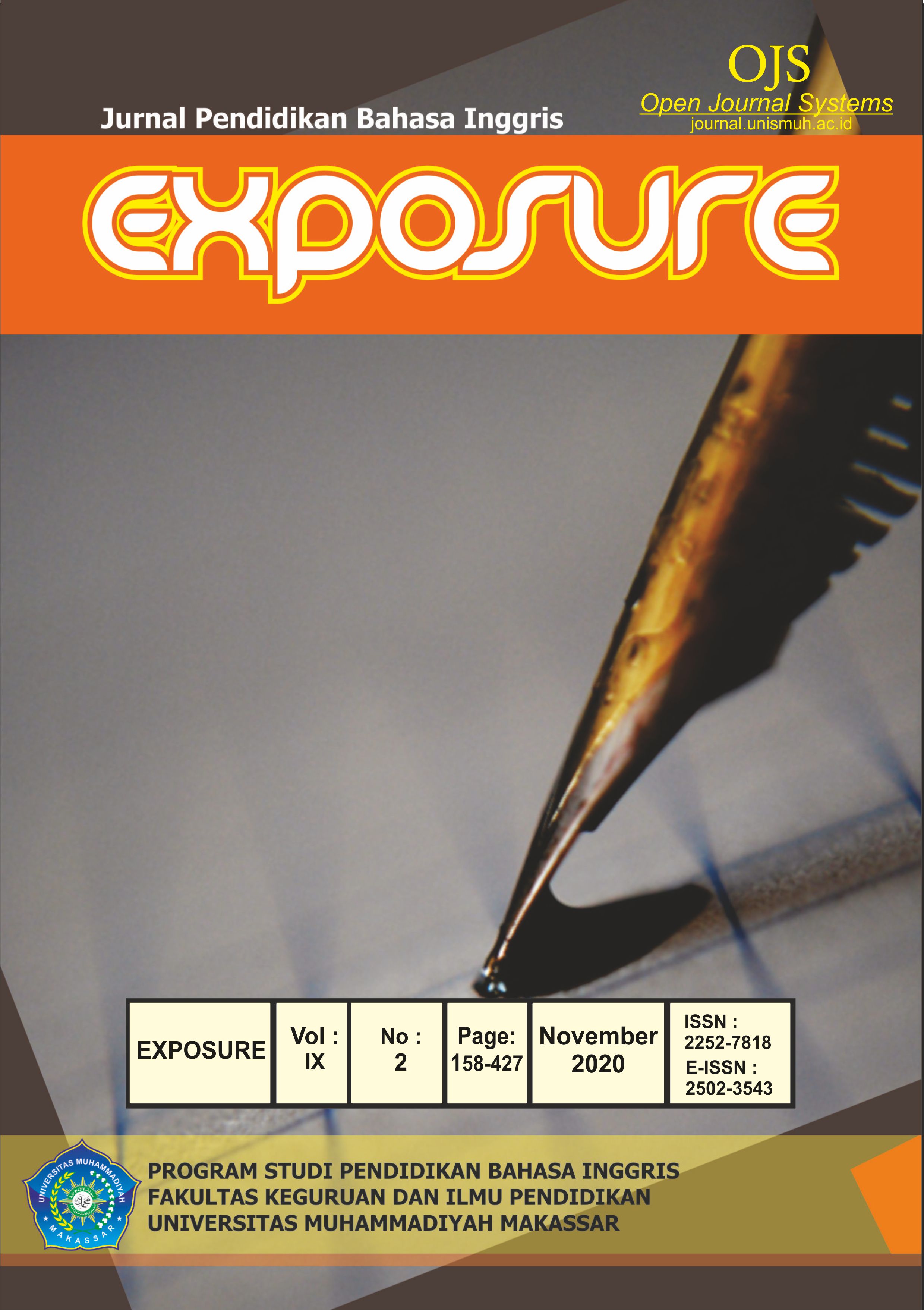ENHANCING THE STUDENTS’ WRITING ABILITY AT STKIP MUHAMMADIYAH BULUKUMBA THROUGH LEARNING FROM ERROR METHOD
DOI:
https://doi.org/10.26618/exposure.v9i2.4134Keywords:
Writing Ability, Learning from Error Method, Language UseAbstract
The objective of this research were to find out the effectiveness of Learning from Error Method to enhance the writing ability and the attitude of the second semester students of English Department of University of Muhammadiyah Bulukumba toward the application of Learning from Error Method in learning writing. The research is restricted to grammatical aspect or language use. The research used Pre-experimental design. It took by using convenience-sampling technique, which chose the class 19 B that consisted of 27 students to be sample. The instrument of the research used the subjective test of writing to know the achievement of the students’ writing ability. The test was having the students write a descriptive paragraph according to the title given. The questionnaire is given to know the attitude of students toward the application of learning from error method to enhance their achievement in writing ability. The result of this research shows that there is significant different between the mean score of the students’ pre-test and the students’ post-test. The result of the t-test indicates that the value 1.39 from the t-test is higher than the t-table 1.315. It means that learning from error method is an effective method in teaching writing. The students have positive attitude toward learning from error method. It is indicated by the result of the questionnaires given to the students, which consist of ten items.
References
Axelrod, B. Rise and Charles, R Coper (1985) The St. Martin’s Guide to Writing. St. Martin’s Press. Inc.
Baya, Nur. St (2006) Using Brainstorming Techniques to Improve the Writing Skill of the Second Grade Students of MAN Malakaji Gowa. Thesis Makassar: UIN Alauddin.
Brown, H. Douglas. 2007. Principles of Language Learning and Teaching, Fifth Edition. The United State of America. https://www.researchgate.net/publication/247252022_Principles_of_Language_Learning_And_Teaching
Dirgeyasa, Wy (2016). The Improvement of Students’ Writing Skill Achievement through Error Analysis Method. European Centre Research Training and Development UK: Vol. 4, No. 3, pp.1-10, March 2016. www.eajournals.org Accessed on 9 June 2020.
Gay, L.R. (2006). Education Research Competences for Analysis & Application. Second Edition. Ohio: Bell & Howell Company.
Gocsik, (2004). Common Error in English /www. darmouth.edu/-writing/materials/tutor/problems/grammar.sh. tmc. Accessed on 15-08-2019.
Heaton, J.B, (1991) Writing English Language Test, New Ysork: Longman Publisher.
Ismail, A. Fasisal. (2004) The Influence of Learning Styles of the Seventh Semester Students of English Department of IAIN Alauddin Makassar toward Writing Achievement. Thesis Makassar: IAIN Alauddin.
Klassen, J. (1995), “Using Students Error for Teaching” Krael, T. (Ed) Creative English Teaching Forum. Washington D.C. English Language Progress Division United States Information Agency.
Nasriana, Andi. (2005), Error Analysis of Indonesian Syntactic or English Sentences Made by the Years Students of SMA Negeri I Bulukumba. Thesis Makassar: UIN Alauddin.
Sahib, Nurfaizah, (2005) Error Analysis in Using Tenses in Composition at the Fifth Years Students of Islamic Boarding School of An-Nahdlah Layang Makassar. Thesis Makassar: UIN Alauddin Makassar.
Satarian, Adnan (2014) Writing Skill and Categorical Error Analysis: A Study of First Year Undergraduate University Students. Dissertation Australia: University of Tasmania (UTAS). IJRECT, Vol. I-Winter 2014-No.3. https://www.researchgate.net/publication/288592066 Accessed on 9 June 2020.
Setiyadi, Bambang. Ag, (2006) Teaching English as a Foreign Language, Yogyakarta: Graha Ilmu
Downloads
Additional Files
Published
Issue
Section
License
Authors who publish with this journal agree to the following terms:
In order to assure the highest standards for published articles, a peer review policy is applied. In pursue of the compliance with academic standards, all parties involved in the publishing process (the authors, the editors and the editorial board and the reviewers) agree to meet the responsibilities stated below in accordance to the Journal publication ethics and malpractice statement.
Duties of Authors:
- The author(s) warrant that the submitted article is an original work, which has not been previously published, and that they have obtained an agreement from any co-author(s) prior to the manuscript’s submission;
- The author(s) should not submit articles describing essentially the same research to more than one journal;
- The authors(s) make certain that the manuscript meets the terms of the Manuscript Submission Guideline regarding appropriate academic citation and that no copyright infringement occurs;
- The authors(s) should inform the editors about any conflict of interests and report any errors they subsequently, discover in their manuscript.
Duties of Editors and the Editorial Board:
- The editors, together with the editorial board, are responsible for deciding upon the publication or rejection of the submitted manuscripts based only on their originality, significance, and relevance to the domains of the journal;
- The editors evaluate the manuscripts compliance with academic criteria, the domains of the journal and the guidelines;
- The editors must at all times respect the confidentiality of any information pertaining to the submitted manuscripts;
- The editors assign the review of each manuscript to two reviewers chosen according to their domains of expertise. The editors must take into account any conflict of interest reported by the authors and the reviewers.
- The editors must ensure that the comments and recommendations of the reviewers are sent to the author(s) in due time and that the manuscripts are returned to the editors, who take the final decision to publish them or not.
Authors are permitted and encouraged to post online a pre-publication manuscript (but not the Publisher’s final formatted PDF version of the Work) in institutional repositories or on their Websites prior to and during the submission process, as it can lead to productive exchanges, as well as earlier and greater citation of published work (see The Effect of Open Access). Any such posting made before acceptance and publication of the Work shall be updated upon publication to include a reference to the Publisher-assigned DOI (Digital Object Identifier) and a link to the online abstract for the final published Work in the Journal.

